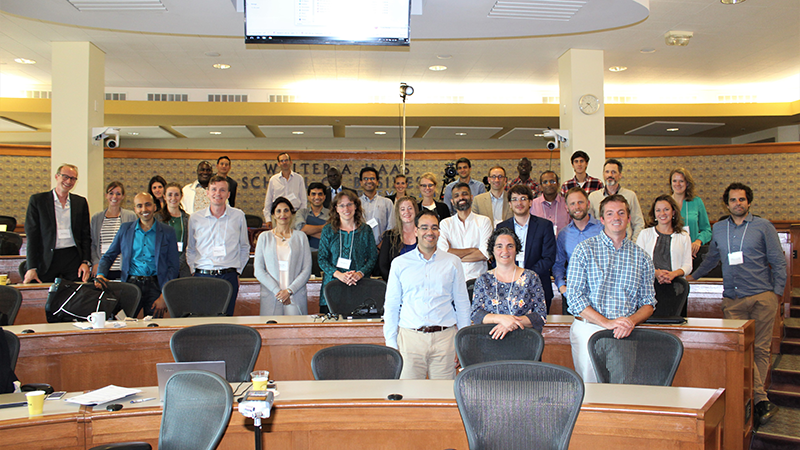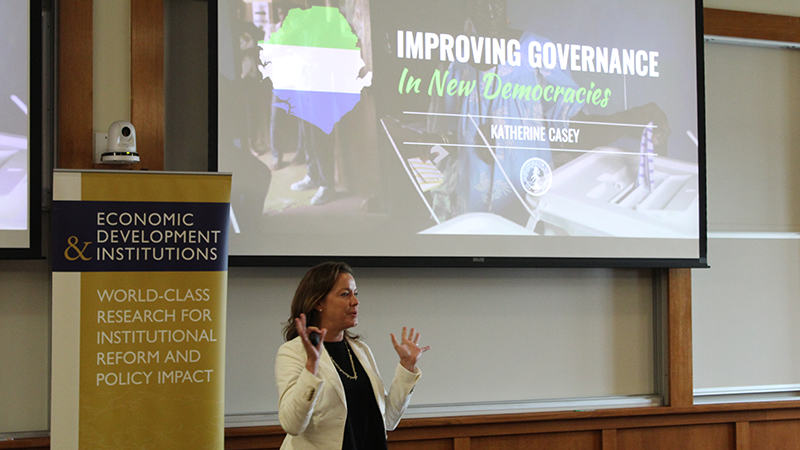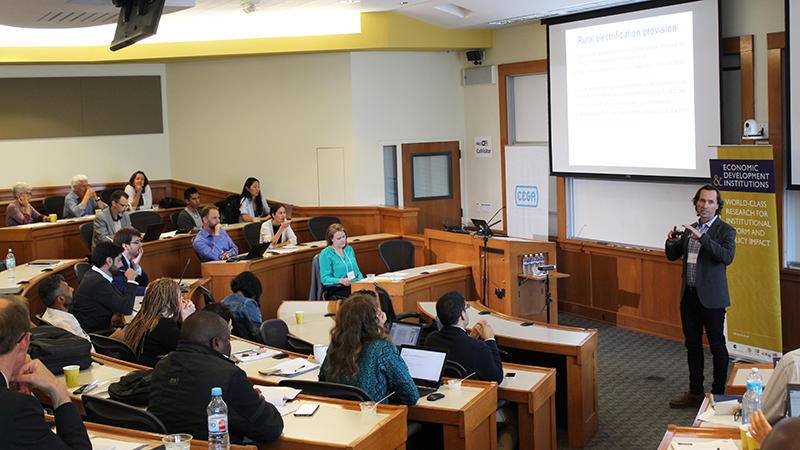Don’t disseminate, co-create: Reflections on connecting research with policy
In 2015, the UK Department for International Development (DFID) launched a comprehensive research initiative with an ambitious goal: to fill critical evidence gaps regarding the role of public institutions in catalyzing economic growth and development. Economic Development & Institutions (EDI), led by Oxford Policy Management, the Paris School of Economics, the University of Namur, and Aide à la Décision Economique, was designed to generate insights on how best to increase the responsiveness of state institutions. Previously, motivated public servants and their civil society partners were left with little guidance on how different reforms might get better results.
The EDI consortium enlisted the Center for Effective Global Action (CEGA) at UC-Berkeley to lead a core component of the program: building a portfolio of randomized controlled trials to test a series of high-profile policy reforms in real-world institutions. Through competitive funding rounds in 2017 and a series of evaluation co-creation activities, we identified 80 researchers and 35 different implementing agencies to run 30 field experiments in 12 different countries around the world.
In late August, we convened the EDI community at UC-Berkeley for “Sharing Solutions, Sharing Strategies: A Policy Institute for Innovations in Public Services.” Participants had an opportunity to hear about all the work being carried out across the consortium, which helped us identify important synergies. Researchers also had a rare opportunity to gain feedback on work-in-progress. Faculty leads Ernesto Dal Bó and Frederico Finan who also serve as CEGA Scientific Directors for Political Economy, facilitated a two-day peer-learning workshop for 13 implementing partners collaborating on EDI evaluations.

Of the important issues that were brought to the table, several insights really stood out:
Big questions abound: EDI was motivated by the fact that critical research gaps stunt the ability of public sector reformers and civil society groups to affect positive change. Our event was a fresh reminder of the urgency of this goal. During the sessions, Bilal Siddiqi, economist in the Development Research Group of World Bank and leader of the excellent Data and Evidence for Justice Reform, delivered a powerful presentation (State of Science: The Judiciary) on what is known about the inner workings of courts and justice systems. Sadly, inefficiencies, delays, and pernicious levels of bias are well documented in the literature while the troves of court data that could be used to address these problems frequently go unused. Finan and Dal Bó presented their work (The State of Science: Institutions, State Capabilities, and Development) assessing how public institutions can effectively recruit personnel and monitor employees, drawing on groundbreaking work in Mexico and Paraguay. The nature of the policy questions posed was remarkable: governments often offer competitive wages as a key incentive to attract quality personnel, but are financial rewards really the best way to incentivize a life in public service? Moreover, if monitoring the performance of state personnel works, who is best placed within the bureaucracy to select those in specific need of oversight? Answering these questions is a first order priority if even the most basic public services are to be met.
Solutions are out there: While the open research questions loomed large, we were excited to offer some solutions. Fourteen EDI researchers were able to present their evaluations at the event (see links at the end of this article), sharing insights on taxation, legal protections, public service provision, among many issues. Beyond the impact of any individual study, however, the key value proposition of EDI is the learning the program will generate across its portfolio. All studies respond directly to a set of 40 open research questions identified at the onset of the program after an extensive review of over 200 impact evaluations. Linking studies around this framework ensures EDI research is not only frontier, but generalizable to diverse contexts. Moreover, EDI strives to answer the immediate policy questions in addition to responding to global research priorities. All studies have been co-created with researchers working alongside over 35 different implementing partners to design evaluations that meet local needs while contributing to wider debates. This distinguishing feature of EDI goes beyond efforts of conventional research programs. It began with a ‘match-making workshop’ at the start of the EDI program in which researchers and policy makers met to identify how potential research projects could address policy priorities. The selection process for EDI funding then prioritized projects with a strong local implementing partner – most often a government counterpart. This event was the continuation to share insights early in order to meet time-critical policy demands.

Progress is good, but there is more we can do: Interacting with the implementing partners at our event underscored the challenges inherent in integrating evidence into policy. CEGA is proud to be a part of a community of research organizations that regularly provides rigorous evidence to policy reformers across the developing world. However, the collaboration with EDI counterparts has led CEGA to wonder whether their research is sufficiently tailored to meet the needs of the policymakers with whom we work. When we asked participants how research organizations like CEGA can better serve them, here’s what they said:
- Keep co-creating: Implementing partners expressed an appreciation for EDI’s and CEGA’s commitment to “co-creating” policy research. At the same time, there was a sense that researcher-implementer partnerships should not be limited to the design phase of a new evaluation. Perspectives from implementers can meaningfully inform nearly every aspect of our research program, at all stages of the pipeline. For example, our implementing partners indicated that the policy briefs many research organizations produce are most useful when they present step-by-step procedural information with specific timelines and budget considerations for the reforms being evaluated. This is a great insights, and, to our knowledge, this type of data rarely appears in the research summaries circulating in many parts of the evaluation community. At EDI, we are now actively considering how perspectives from policy partners can be more actively integrated within the full spectrum activities we have planned.
- No time to waste: Our implementing partners make numerous decisions everyday and regularly need information on a diversity of issues. The final results of the evaluations EDI is supporting will only partially meet their information needs. While we are not in a position to provide consulting services, we believe we can leverage evaluations across the EDI portfolio to answer questions that come up along the way. Rather than waiting for the full results of evaluations, we are exploring ways to directly support our partners now. Through EDI, we will do this by drawing together findings from the randomized control trials, our case studies, pathfinding papers and the country institutional diagnostic in conferences, targeted meetings and policy briefs.
- Build local research capacity: All of our implementers truly appreciate working with researchers from top universities and institutes globally such as UC Berkeley and all others that are part of the EDI network. These collaborations provide them access to the world’s leading research organizations, specialized evaluation skills, and some of the most well-respected social scientists in their fields. At the same time, they broadly called for more integration of researchers from their local research organizations, universities, and think tanks into rigorous policy evaluation programs. CEGA has a long history of building such partnerships in Latin America, South Asia, and Sub-Saharan Africa. In the coming period, we want to explore with our partner within the EDI consortium how we might work could better align these efforts with the initiative.

Participants at the event “Sharing solutions, Sharing strategies”
As we continue to assess how these and other insights from our event might help shape our work, we also want to thank all those that participated in the convening. In particular, major appreciation to our organizing team Leah Bridle, Benjamin Klooss, Harriett Butlin, Elisa Cascardi. We thank Ernesto Dal Bó, Frederico Finan, and Edward Miguel for their guidance and support. We also greatly appreciate the wonderful contributions of our DFID advisor Liz Brower, David Sasaki of the Hewlett Foundation, Bilal Siddiqi of the World Bank, CEGA affiliates Kate Casey and Michael Callen, and friends from the Evidence in Governance and Politics Program, the Transparency and Accountability Initiative, and our host, the Haas School of Business.
This blog was written by Andrew Westbury, Center for Effective Global Action
Links to presentations
- Bringing property owners into the tax net (pdf) — Watch the video
- Can performance pay attract, motivate and retain better teachers? (pdf) — Watch the video
- Community Policing and Public Trust (pdf) — Watch the video
- Improving court efficiency (India, Kenya, Tanzania) (pdf) — Watch the video
- Improving management and accountability for public service delivery (pdf) — Watch the video
- Improving the effectiveness of labor courts (pdf) — Watch the video
- Institutional reform and de facto women’s rights (pdf) — Watch the video
- Performance-based incentives in multi-layered organisations (pdf) — Watch the video
- Political economy and governance of rural electrification (pdf) — Watch the Video
- Politician entry, selection and performance (pdf) — Watch the video
- Relaxing credit and tenure security constraints (pdf)— Watch the video
- Tax audits under weak fiscal capacity (pdf) — Watch the video
- What is bogus: Catching fraudulent firms in India (pdf) — Watch the video
- State of science: Institutions, state capabilities and development
- State of science: The judiciary




